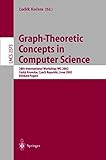Graph-Theoretic Concepts in Computer Science [electronic resource] : 28th International Workshop, WG 2002 Český Krumlov, Czech Republic, June 13–15, 2002 Revised Papers / edited by Gerhard Goos, Juris Hartmanis, Jan Leeuwen, Luděk Kučera.
Material type: TextSeries: Lecture Notes in Computer Science ; 2573Publisher: Berlin, Heidelberg : Springer Berlin Heidelberg, 2002Description: XI, 422 p. online resourceContent type: text Media type: computer Carrier type: online resourceISBN: 9783540363798Subject(s): Computer science | Data structures (Computer science) | Computer software | Electronic data processing | Computational complexity | Computer graphics | Computer Science | Algorithm Analysis and Problem Complexity | Data Structures | Numeric Computing | Discrete Mathematics in Computer Science | Probability and Statistics in Computer Science | Computer GraphicsAdditional physical formats: Printed edition:: No titleDDC classification: 005.1 LOC classification: QA76.9.A43Online resources: Click here to access online
TextSeries: Lecture Notes in Computer Science ; 2573Publisher: Berlin, Heidelberg : Springer Berlin Heidelberg, 2002Description: XI, 422 p. online resourceContent type: text Media type: computer Carrier type: online resourceISBN: 9783540363798Subject(s): Computer science | Data structures (Computer science) | Computer software | Electronic data processing | Computational complexity | Computer graphics | Computer Science | Algorithm Analysis and Problem Complexity | Data Structures | Numeric Computing | Discrete Mathematics in Computer Science | Probability and Statistics in Computer Science | Computer GraphicsAdditional physical formats: Printed edition:: No titleDDC classification: 005.1 LOC classification: QA76.9.A43Online resources: Click here to access online  E-BOOKS
E-BOOKS
| Current library | Home library | Call number | Materials specified | URL | Status | Date due | Barcode |
|---|---|---|---|---|---|---|---|
| IMSc Library | IMSc Library | Link to resource | Available | EBK4272 |
Maximum Cardinality Search for Computing Minimal Triangulations -- DNA Sequencing, Eulerian Graphs, and the Exact Perfect Matching Problem -- On the Minimum Size of a Contraction-Universal Tree -- Optimal Area Algorithm for Planar Polyline Drawings -- Cycles in Generalized Networks -- New Graph Classes of Bounded Clique-Width -- More about Subcolorings -- Search in Indecomposable Graphs -- On the Complexity of (k, l)-Graph Sandwich Problems -- Algorithms and Models for the On-Line Vertex-Covering -- Weighted Node Coloring: When Stable Sets Are Expensive -- The Complexity of Restrictive H-Coloring -- A New 3-Color Criterion for Planar Graphs -- An Additive Stretched Routing Scheme for Chordal Graphs -- Complexity of Pattern Coloring of Cycle Systems -- Safe Reduction Rules for Weighted Treewidth -- Graph Separator Algorithms: A Refined Analysis -- Generalized H-Coloring and H-Covering of Trees -- The Complexity of Approximating the Oriented Diameter of Chordal Graphs -- Radiocolorings in Periodic Planar Graphs: PSPACE-Completeness and Efficient Approximations for the Optimal Range of Frequencies -- Completely Independent Spanning Trees in Maximal Planar Graphs -- Facets of the Directed Acyclic Graph Layering Polytope -- Recognizing When Heuristics Can Approximate Minimum Vertex Covers Is Complete for Parallel Access to NP -- Complexity of Some Infinite Games Played on Finite Graphs -- New Algorithms for k-Face Cover, k-Feedback Vertex Set, and k-Disjoint Cycles on Plane and Planar Graphs -- A Multi-scale Algorithm for the Linear Arrangement Problem -- On the b-Chromatic Number of Graphs -- Budgeted Maximum Graph Coverage -- Online Call Admission in Optical Networks with Larger Demands -- The Forest Wrapping Problem on Outerplanar Graphs -- On the Recognition of P 4 -Comparability Graphs -- Bend-Minimum Orthogonal Drawings of Plane 3-Graphs -- Cluster Graph Modification Problems -- Two Counterexamples in Graph Drawing -- Connected and Loosely Connected List Homomorphisms -- Any Load-Balancing Regimen for Evolving Tree Computations on Circulant Graphs Is Asymptotically Optimal.
The 28th International Workshop on Graph-Theoretic Concepts in Computer ? Science (WG 2002) was held in Cesky ´ Krumlov, a beautiful small town in the southern part of the Czech Republic on the river Vltava (Moldau), June 13–15, 2002. The workshop was organized by the Department of Applied Mathematics of the Faculty of Mathematics and Physics of Charles University in Prague. Since 1975, WG has taken place in Germany 20 times, twice in Austria and The Netherlands, and once in Italy, Slovakia, and Switzerland. As in previous years, the workshop aimed at uniting theory and practice by demonstrating how graph-theoretic concepts can be applied to various areas in Computer Science, or by extracting new problems from applications.The workshop was devoted to the theoretical and practical aspects of graph concepts in computer science, and its contributed talks showed how recent research results from algorithmic graph theory can be used in computer science and which graph-theoretic questions arise from new developments in computer science. Altogether 61 research papers were submitted and reviewed by the program committee. The program committee represented the wide scienti?c spectrum, and in a careful reviewing process with four reports per submission it selected 36papersforpresentationattheworkshop.Thereferees’commentsaswellasthe numerous fruitful discussions during the workshop have been taken into account by the authors of these conference proceedings.


There are no comments on this title.